A Community of Growers in Southern Appalachia
The morning sun bursts through the treetops as I turn off the dirt road that runs through Celo Community. I just finished my weekly cow-milking shift. As I cross the bridge home toward the bed and breakfast I operate with my husband, I can see my pickup truck where I left it in the shade of our apple trees. Just an hour ago, the truck was empty, but now as I return with fresh milk, the back is full of boxes. Each is overflowing with vegetables, herbs, and flowers, all freshly picked in my valley. The food and flowers are being donated to Dig In! Yancey Community Garden, where they will be shared free of charge.
Yancey County is a rural county in western North Carolina, about an hour northeast of Asheville. In many ways, we are fairly typical of Southern Appalachia. The county is home to about 18,000 people. The historic isolation and extractive economics of communities in the mountains have led to strong traditions of folks sharing what they have and helping when they can, especially among family, church, and close neighbors. We are a heavily agricultural county, but are also considered the most mountainous county in the state, so much of the farmland is cattle, hay, or timber. Still there are plenty of family farms and gardens growing vegetables for market and their kitchens.
What is unique to this county, though, is that Quakers have been an important part of the fabric for multiple generations. Celo Community was founded in the 1930s as an experiment in cooperative living and right relationship with the land. In its early years, members were recruited heavily from Quaker networks and conscientious objector camps. A Quaker worship group was founded as early as 1946 and officially became a monthly meeting in 1949. Through the years, many members or attenders of Celo Friends Meeting (CFM) have been involved in the local food system, where they have brought their thoughtfulness and integrity as Quakers to that work.
Two Quaker institutions within Celo Community have been connecting people to food and farming for over 50 years. Arthur Morgan School (AMS) is a boarding and day school for 12- to 15-year-olds. Camp Celo is a summer camp for 7- to 14-year-olds. Both feature large organically tended gardens and a variety of livestock that feed the communal kitchens, which is just one way the Quaker values of simplicity and stewardship for the earth are embedded into the daily life of each institution.
The two gardens also exemplify the values of community. Separated by only a pine hedge, they work cooperatively to share tools, seeds, and a helping hand. They also both keep dairy cows that they operate as community cow shares. Dairy cows are a lot of work. They must be milked one to two times a day; given feed and water daily; and when using the regenerative practice of rotational grazing, frequently rotated through pastures. In a community cow share, neighbors take on some of that responsibility in exchange for milk. I was the farm coordinator at AMS in 2014 through 2021, and even though I no longer work there, I still get to keep my weekly date with Clover the cow.
Like the farm coordinators before me and the current one, I would teach internships at AMS where students learned the skills of farming while studying related topics in biology, chemistry, and history. Some of the livestock is raised for meat consumption, and when it is time to harvest the animals, students and staff discuss the ethics and personal responsibility of their food choices before deciding whether to participate.

Bastien Clemmons: I have always had an affinity for animals (I love horses), and I don’t mind playing in dirt, so my first year at AMS, I signed up for the farm internship. I don’t think I could’ve prepared myself for the impact working on an active farm in a Quaker setting has had on my life. Beyond learning the science and skills of farming, I think more critically about how agricultural and consumption practices affect our earth. I’ve learned about respecting my surroundings and how to center myself where I am.
At Camp Celo, children engage in a variety of daily farm chores, from bottle feeding calves to harvesting lettuce for lunch. The current garden managers, Olivia and Rocky Ramos, host themed garden days celebrating the traditional corn varieties they grow. They teach the campers the creation mythologies of the Tsalagi (Cherokee) people, who used to live on this land, then practice grinding corn flour and lead the kids through a playful corn maze.
In the off-season from summer camp, Olivia and Rocky run a food fermentation business, Soil Shine Farm and Ferments, to provide their community with nutrient-dense, alive food year-round. They grow and source organic vegetables locally. The “soil shine” refers to the sparkling mica we find in the soil here. Their business is thriving, but they will just as eagerly trade as sell their food when that more directly meets the needs at hand. “I love it when we can pay a babysitter in sauerkraut!” Olivia shares.
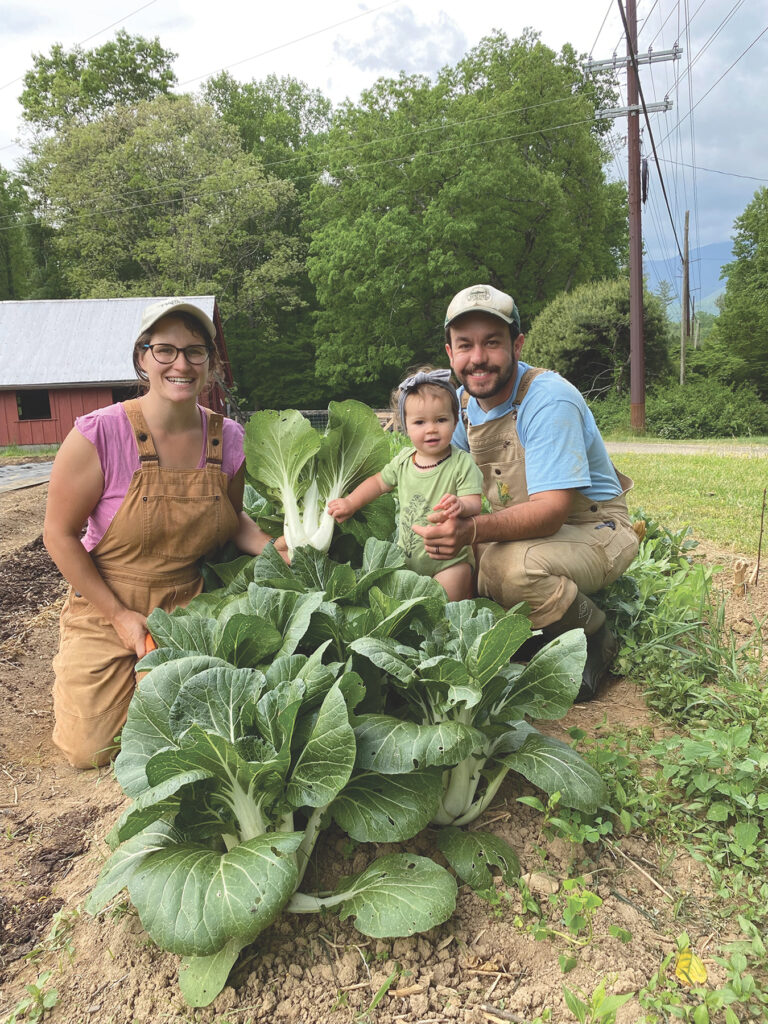
Olivia Ramos: Living with integrity, to me, is being intimately and interdependently connected with my neighbors and the land. Rocky and I started growing food cooperatively because we wanted access to high-quality food but could not afford it, nor did we have the time to grow and process it all on our own. So we found others who wanted the same things, helped each other out, and made a bunch of friends in the process. I’m learning that growing food and growing community are deeply interrelated. For growing food, the foundation is soil. For growing friendships, the foundation is trust. Both need to be built intentionally and over time. We build trust through reciprocity and honesty, which becomes a sort of “cultural topsoil.” It then becomes a positive feedback loop, where people who are interested in building community are attracted to the work we are doing, join us, and expand on it.
A few years ago, Olivia and Rocky helped organize a mutual-aid collective in the valley. The effort arose out of conversations between elders and younger residents in the valley about the difficulty of getting established without generational wealth. One of these elders was Gred Gross, another CFM member. As young folks spoke about the challenges of supporting themselves in our valley, he realized that he and others had skills, tools, and resources to help.
Building on other more informal networks of support, the mutual-aid group established a community food forest, a listserv for posting needs and offerings, and revitalized a “crop mob” effort to bring groups of people together to complete projects at members’ homesteads, like clearing new garden space or installing a greenhouse. A dream of the group continues to be supporting members to construct affordable tiny homes.
Gred first got interested in growing food sustainably in 1980 after taking a permaculture design course. His home in Celo Community, however, is on a hillside in the woods. So he approached another community member who lived in the river floodplain, Herb Walters. Herb is also a Friend and founder of the nonprofit Listening Project (originally named Rural Southern Voice for Peace).
For both Gred and Herb, growing food together has been a practice of care. “The product is less important than the process,” reflects Gred. “Something is always going to go wrong in the garden. But as long as you are building relationships and working together, you’re producing something good.” Since Herb’s passing in 2020, Gred has invited others to share garden space and care for the livestock with him.
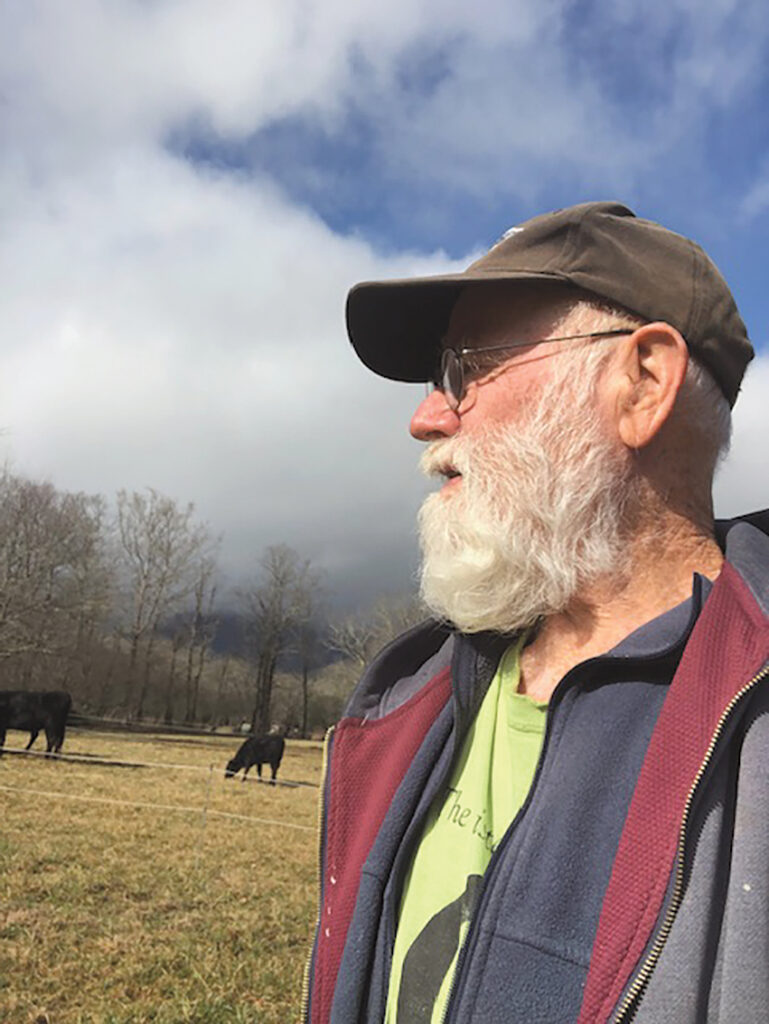
Gred Gross: Lately I have been thinking about hope and how important it is to focus close to home. Things can feel so hopeless on the global scale. But when I am at home, piddling around, there is always something I can do to make things better. I am practicing moving beyond despair to love. It is like being with a dying friend. We can do that with the earth and our neighborhood. One of my passions is making biochar, which is an activated charcoal that I add to the soil to sequester carbon and act as a reservoir of nutrients to catalyze biological activity. Each batch I make and share is a small act of hope for the future.
One of the farmers raising cows and pigs with Gred is Jim Stockwell, yet another Friend. Jim operates Common Ground Farm, a market garden down the road from Celo Community. He has been a vendor at the small Yancey County farmers’ market for almost 20 years and recently served on their board. “For me, it’s about keeping community as local as possible. Through the farmers’ market, we bring newer folks and generational residents together over the shared need for good food.”
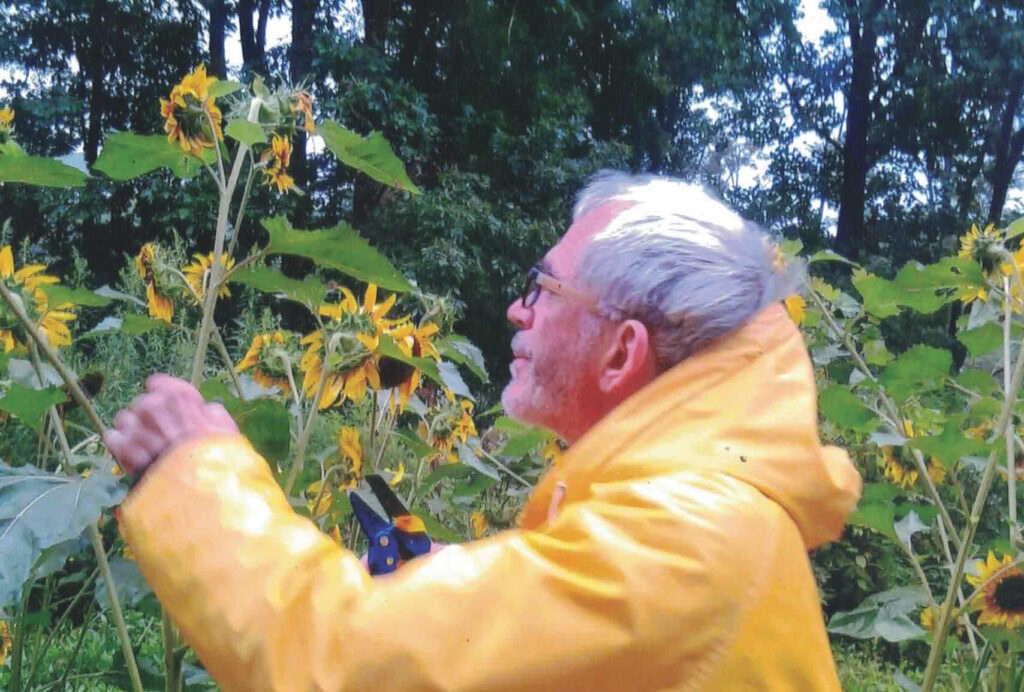
Jim Stockwell: I was initially attracted to growing food as a life-affirming endeavor, both spiritually and politically. It is an act of earthcare. But how we as humans live within and care for our environment is also political. Sharing food, resources, and knowledge of how to produce food is political. One of the main reasons I chose to be a farmer was to have more control over how I share resources with my community. I am against our income taxes being used to fund war-making, and as a self-employed farmer, I can be a war tax resister as well.
Another farming Friend, Cedar Johnson, sells her vegetables, meat, and eggs in the county through an online ordering system. She grew up in Celo Community, and attributes her interest in growing food to her time as a student at AMS. She and her husband, Ben McCann, started their organic farm, Goldfinch Gardens, after they moved back to the community in 2004.
Cedar and Ben had initially relied on selling their produce to upscale restaurants outside of this community, but several years ago they transitioned to exclusively selling food to their neighbors. Cedar reflects, “I love going to a potluck and seeing all the food that people bring is food that I grew. That’s when I really feel I’m feeding my community.”
But staying affordable can be hard in a rural, under-resourced community. One of the ways they bridge that gap is by inviting neighbors to work trade with them. Cedar strives to create an atmosphere where her work traders enjoy gathering together for meaningful work, learn the skills of growing food, and are abundantly fed by the garden in exchange.
Beyond that, Cedar instructs a volunteer crew on what crops can be gleaned from the garden each week, which brings me back to my pickup truck and the local nonprofit Dig In! Yancey Community Garden. While I was milking, Goldfinch’s gleaning team, Gred, Olivia, and several other valley growers dropped off boxes and put them in the back of the truck. I take a quick walk through my own garden at the Celo Inn to see what I can add, and then drive it all into town to my day job as the executive director of Dig In.
Once a week during the growing season, Dig In hosts a free produce market called Harvest Share. We also partner with other organizations to deliver bags of fresh produce and dry goods to people’s homes. Honoring and building on the history of neighbors helping neighbors here in Appalachia, we share food from the Dig In garden, as well as donations from community growers (like the boxes in my truck), and food we purchase from local farmers. There are no eligibility requirements for our programs, because we believe good food is a right, not a privilege.
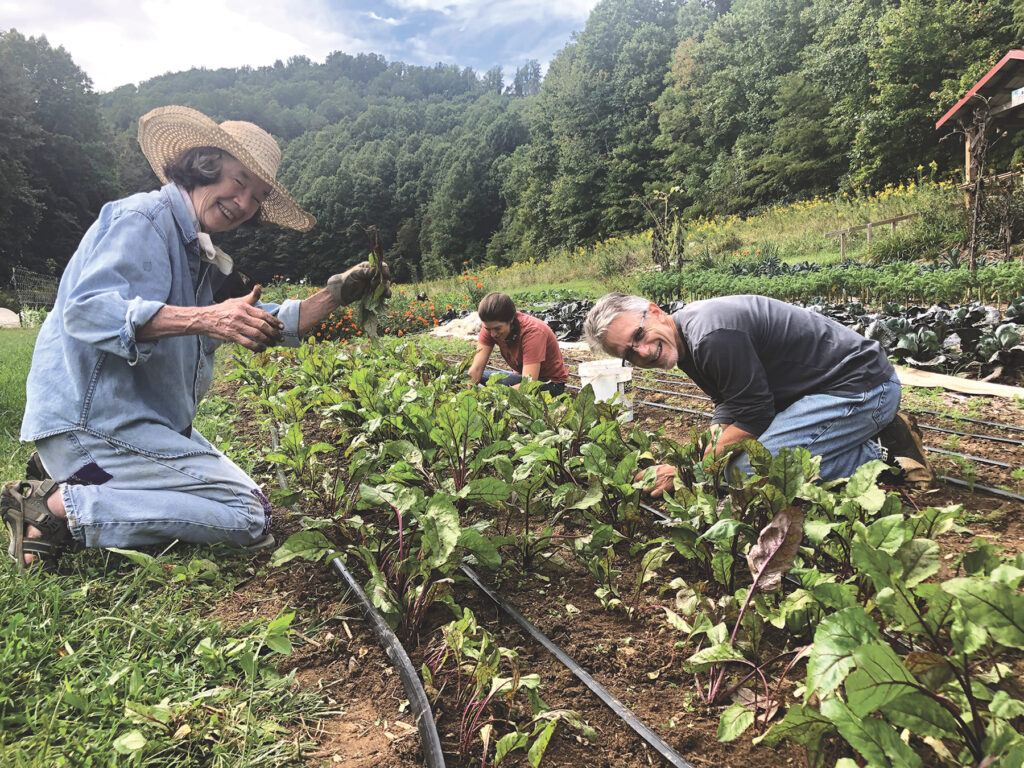
Jennie Boyd Bull: I started volunteering at the Dig In garden when I retired to the area in 2015. After years of wanting to have my own garden, I finally felt ready to start one by learning alongside the staff and other volunteers. I also pick up and deliver fresh veggies from Dig In for local homebound elders through MY Neighbors, another nonprofit founded by a local Quaker. As a member of CFM myself, I am drawn to growing food with and for my community as living the Quaker testimonies of simplicity, integrity, community, equality, and stewardship.
The community garden was founded in 2010, and over a decade later it cultivates almost two acres of vegetables with staff and volunteers. In addition to the staples, we grow specialty items like collards and candy roasters for our Appalachian neighbors, and tomatillos and hot peppers for our Spanish-speaking neighbors. Together, we are building the skills needed for growing food and the practice of sharing the abundance.
As the director of Dig In, the vision I bring to my work is deeply rooted in Quaker values. I have been an attender at Celo Friends Meeting since I moved here in 2010. I emerge from each meeting for worship with a little more clarity on how I wish to “walk cheerfully” and with integrity through this world. And it often comes back to growing and sharing food as a place to practice love for the land and my community.
Food ministry has been important to the meeting for years. That is partially due to how many of the members and attenders are agriculturalists, from home growers like Jennie and Gred to production growers like Jim, Olivia, Cedar, and myself. But for those who wouldn’t know a parsnip from a radish, there is no way to miss the ways that people here come together to feed one another. Raised beds overflowing with squash line the walkway between the meetinghouse and the caretaker’s home. Peas trellis up the swing set in the meeting’s playground, courtesy of the preschool that meets there during the week. The weekly potluck after meeting (now partially reinstated after a pandemic-induced hiatus) features the seasonal vegetables coming out of our gardens.
In a county where one in five children experience food insecurity, the meeting also sees its food ministry as a responsibility of being a part of this community. For years, the meeting has collected donations from its membership to support nonprofits engaged in food relief efforts throughout the larger county, with an emphasis on reaching across the cultural divides in our conservative county. When I first came to Celo, the meeting was raising money to buy fresh fruit for Feed-a-Child, a program that sends backpacks of snacks home with school children. Now, we’re raising money to support the work of Dig In.
Celo Friends Meeting, both as an institution and as a collection of individual Friends, is vibrantly rooted in the local food system, with ripples far beyond our small valley. We operate with collaboration and mutualism, in part because of the ways Quaker spirituality and praxis intertwine to inspire resiliency, sustainability, community, and cooperation.


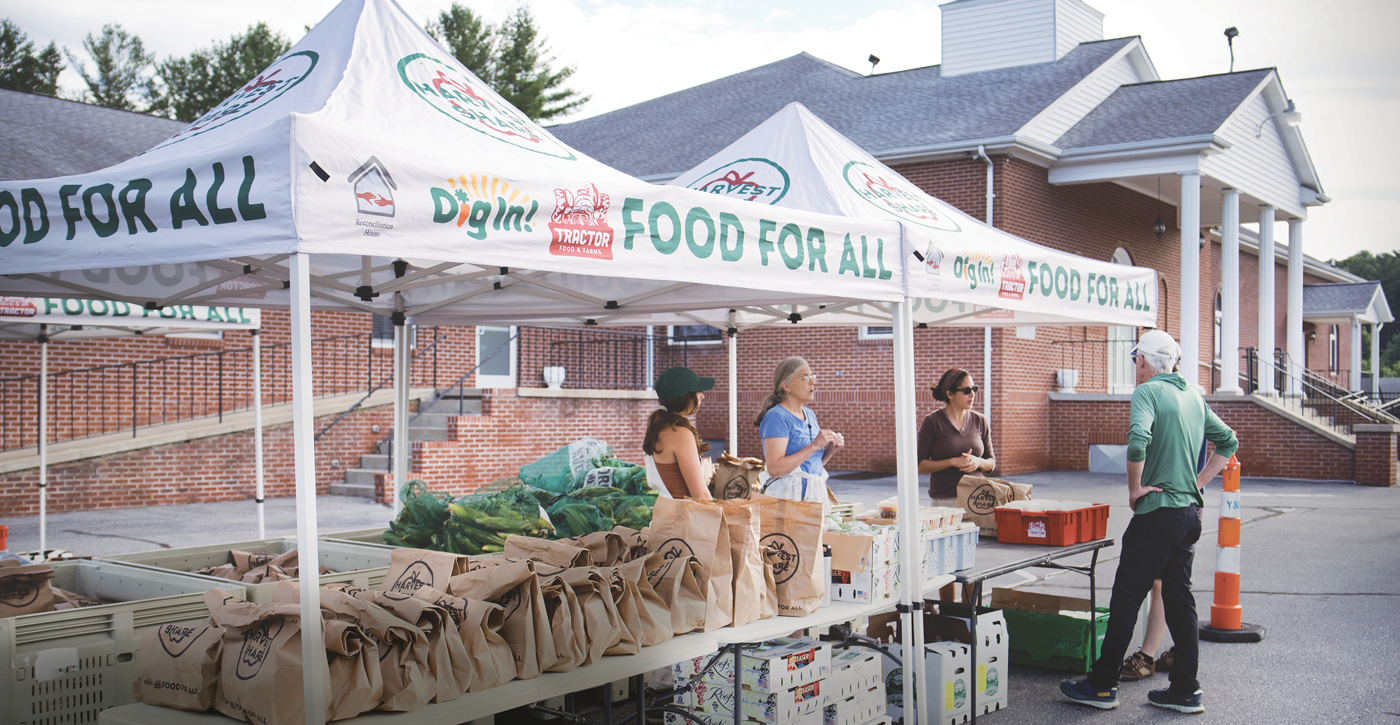
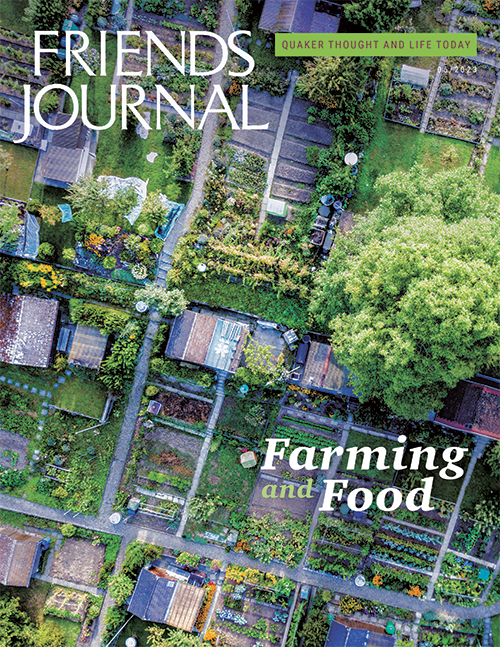
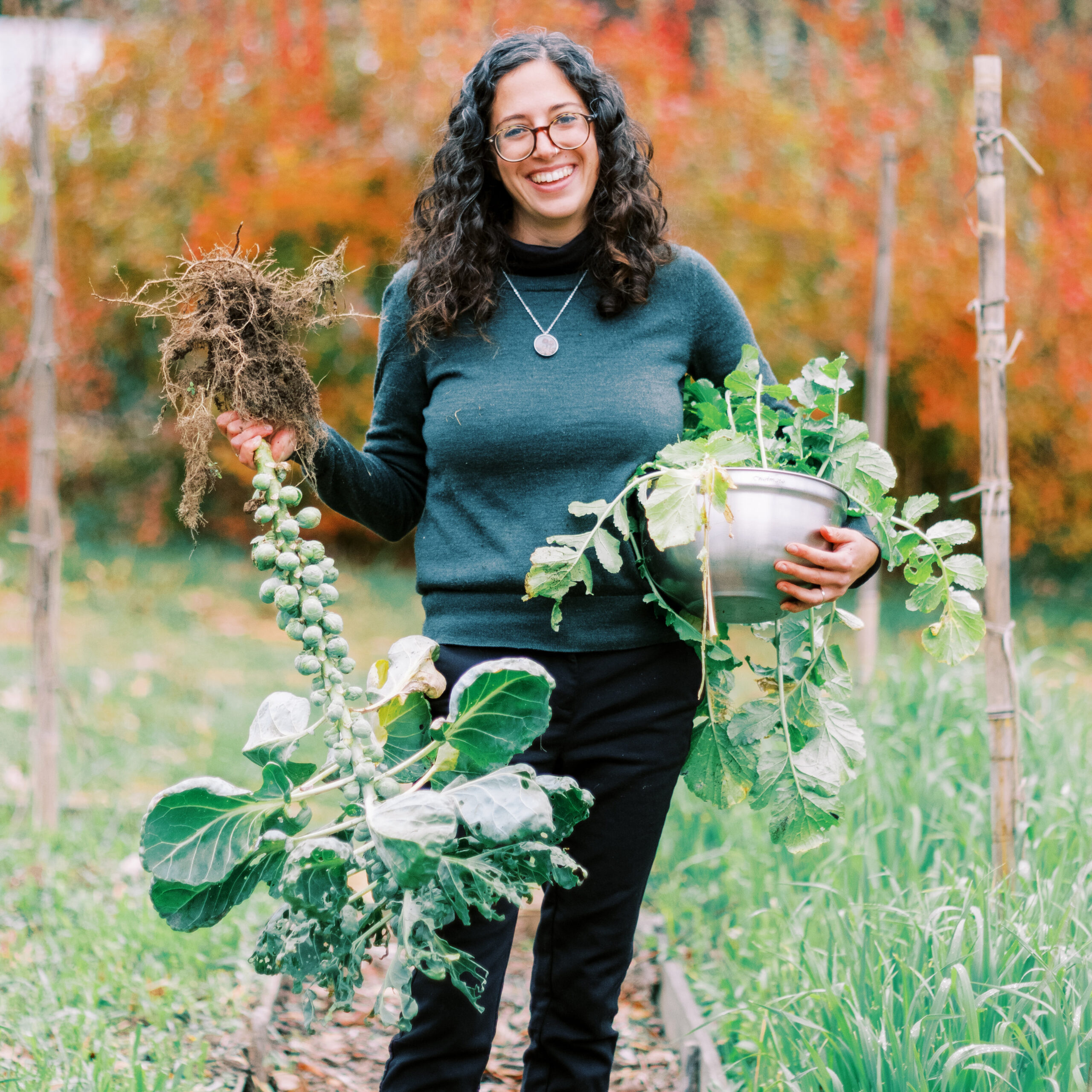
Dear. Friends,
I am a lifelong Friend, a member of Sandwich Monthly Meeting on Cape Cod. I am ninety five, and yet remember well my summers at Celo soon after its founding, when I lived with Arle and Tillie Brooks. These C O’s (from WW II). knew nothing of farming the rather poor soil, even trying to use sawdust as mulch, which killed our plants.
The community of fiercer CO’s called “Macedonia” in Georgia fared worse. I saw their store of potatos rotting in its big bin. I love this article, showing successes over later years! I would like to hear from all of you.
Quakers Forever!! Love, Sunny